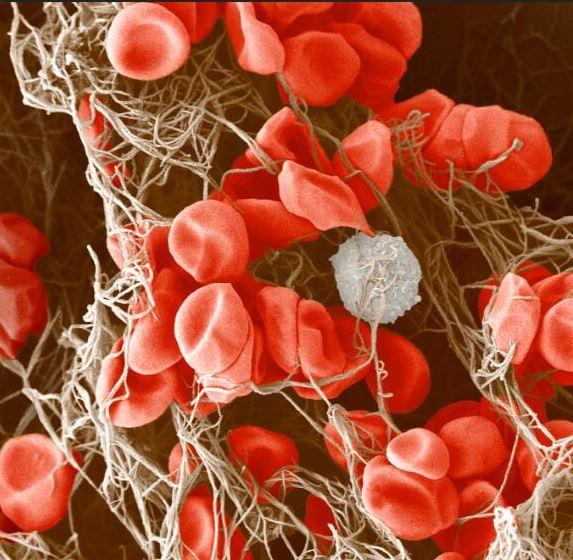Two studies today in the New England Journal of Medicine describe 11 patients in Austria and Germany and 5 in Norway who developed an unusual blood clotting disorder after receiving their first dose of the AstraZeneca/Oxford COVID-19 vaccine.
Clots form in brain, abdomen
The first study, led by researchers at the Institute for Immunology and Transfusion Medicine in Greifswald, Germany, involved 11 patients who had abnormal blood clots or thrombocytopenia (low platelet counts) 5 to 16 days after receiving the AstraZeneca vaccine.
One patient had a fatal intracranial hemorrhage (bleeding in the brain), while nine had cerebral venous thrombosis (blood clots in the brain), three had splanchnic vein thrombosis (blood clots in abdominal veins), three had a pulmonary embolism (blockage in a lung artery caused by blood clots), and four had other types of blood clots. Six patients, in addition to the patient with fatal intracranial hemorrhage, died.
Five patients had disseminated intravascular coagulation, a condition in which blood clots form in different parts of the body and block small blood vessels. No patients had received heparin to prevent blood clots before their symptoms began.
Twenty-eight patients from another sample referred for investigation of vaccine-induced abnormal blood clotting tested positive for heparin-induced platelet factor 4 (PF4) thrombocytopenia antibodies, independent of heparin. All of them also tested positive for platelet-activating antibodies.
Platelets are involved in the blood clotting process. The study authors said high levels of heparin, Fc receptor-blocking monoclonal antibody, and immunoglobulin inhibited platelet activation.
Nine of the 11 patients were women, and the median patient age was 36 years (range, 22 to 49).
Non-heparin blood thinners
The authors noted that 82 million doses of COVID-19 vaccines had been administered in Europe by Apr 7, with a quarter of all vaccinees in Germany and 30% in Austria receiving the AstraZeneca vaccine. Reports of vaccine-induced blood clots began to surface in late February.
The post-vaccine abnormal blood clotting disorder, which resembles one induced by heparin, has been reported in patients not given heparin but taking certain drugs or having viral and bacterial infections. This condition has been termed autoimmune heparin-induced thrombocytopenia, the authors said.
"Unlike patients with classic heparin-induced thrombocytopenia, patients with autoimmune heparin-induced thrombocytopenia have unusually severe thrombocytopenia, an increased frequency of disseminated intravascular coagulation, and atypical thrombotic events," the researchers wrote. "Serum from these patients strongly activate platelets in the presence of heparin…but also in the absence of heparin (heparin-independent platelet activation)."
The researchers said that healthcare providers should be alert for venous or arterial blood clots in unusual sites such as the abdomen or brain in patients 5 to 20 days after receiving the AstraZeneca vaccine.
"Given the parallels with autoimmune heparin-induced thrombocytopenia, anticoagulant options should include nonheparin anticoagulants used for the management of heparin-induced thrombocytopenia, unless a functional test has excluded heparin-dependent enhancement of platelet activation," the authors concluded.
"Finally, we suggest naming this novel entity vaccine-induced immune thrombotic thrombocytopenia (VITT) to avoid confusion with heparin-induced thrombocytopenia."
A 'rare vaccine-related variant'
In the second study, researchers in Norway report on five healthcare workers with venous blood clots in unusual sites and severe thrombocytopenia 7 to 10 days after their first dose of the AstraZeneca vaccine. The workers, who were 32 to 54 years old, also had high concentrations of PF4 antibodies but had not received heparin.
Four patients had cerebral venous thrombosis with intracranial hemorrhage, and three died.
All patients had high levels of D-dimer, indicating blood clots. High-dose heparin was given to four patients, successfully inhibiting blood clots in two of them but less efficiently in the other two. The fifth patient received no heparin.
"Collectively, these results suggest that the serum in these patients contained immune complexes with a mixture of antibody specificities similar to those described in the serum of patients with autoimmune heparin-induced thrombocytopenia," the researchers said. "By providing a link between thrombosis and the immune system, these results strengthen the view that vaccination may have triggered the syndrome."
In Norway, as of Mar 20, when AstraZeneca vaccination was paused, 132,686 healthcare workers and nursing home residents had received one dose. No one had received the second dose.
"Because the five cases occurred in a population of more than 130,000 vaccinated persons, we propose that they represent a rare vaccine-related variant of spontaneous heparin-induced thrombocytopenia that we refer to as vaccine-induced immune thrombotic thrombocytopenia," the authors wrote. "Although rare, VITT is a new phenomenon with devastating effects for otherwise healthy young adults and requires a thorough risk–benefit analysis."





















